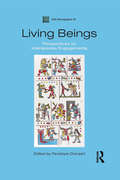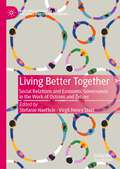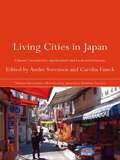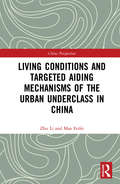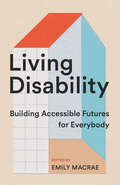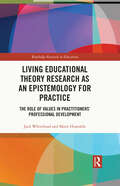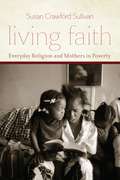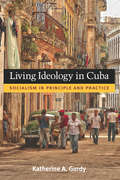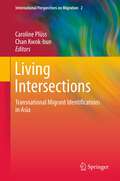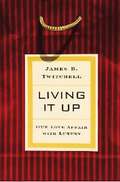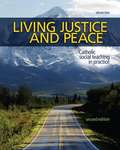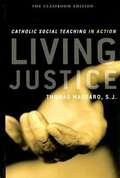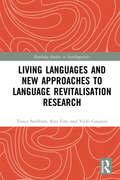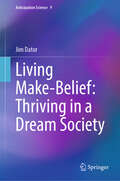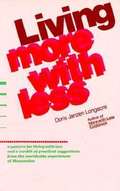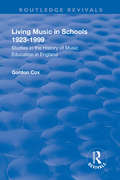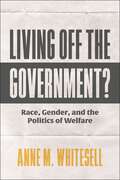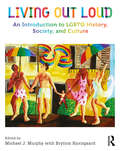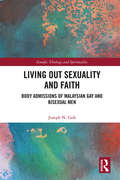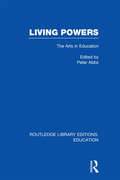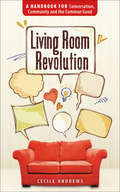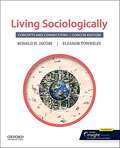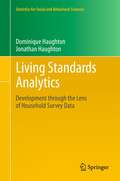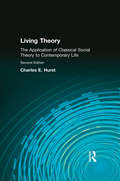- Table View
- List View
Living Beings: Perspectives on Interspecies Engagements (ASA Monographs)
by Penelope DransartLiving Beings examines the vital characteristics of social interactions between living beings, including humans, other animals and trees.Many discussions of such relationships highlight the exceptional qualities of the human members of the category, insisting for instance on their religious beliefs or creativity. In contrast, the international case studies in this volume dissect views based on hierarchical oppositions between human and other living beings. Although human practices may sometimes appear to exist in a realm beyond nature, they are nevertheless subject to the pull of natural forces. These forces may be brought into prominence through a consideration of the interactions between human beings and other inhabitants of the natural world.The interplay in this book between social anthropologists, philosophers and artists cuts across species divisions to examine the experiential dimensions of interspecies engagements. In ethnographically and/or historically contextualized chapters, contributors examine the juxtaposition of human and other living beings in the light of themes such as wildlife safaris, violence, difference, mimicry, simulation, spiritual renewal, dress and language.
Living Better Together: Social Relations and Economic Governance in the Work of Ostrom and Zelizer (Mercatus Studies in Political and Social Economy)
by Virgil Henry Storr Stefanie HaeffeleElinor C. Ostrom, a Nobel prize winning political economist, made important contributions to common pool resources, economic governance, and polycentricity. Viviana A. Zelizer, a prominent economic sociologist, has done groundbreaking work on how culture shapes our economic lives. Together, the work of Ostrom and Zelizer spans the disciplines of economics, sociology, political science, and public policy by exploring the social relations and community-based organization of everyday life. Both scholars examine the norms, social connections, and cultural impacts of exchange and governance. This volume explores their contributions and builds off of their research programs to explore the social movements, community recovery, and war, and women’s issues across a variety of disciplines, including economics, political science, sociology, history, and archaeology. Inspired by Zelizer’s 2019 Ostrom Speaker Series lecture for the F. A. Hayek Program for Advanced Study in Philosophy, Politics, and Economics at the Mercatus Center at George Mason University, this volume explores the connections between the work of Elinor Ostrom and Viviana Zelizer. Beginning with a lead chapter by Zelizer where she reflects on the connections between her work and Ostrom’s oeuvre, the volume brings together scholars who tease out some of the important concepts and implications of Ostrom and Zelizer’s research. This volume furthers economic inquiry by ensuring that the critical examinations of these timely and important themes are made available to students and scholars.
Living Cities in Japan: Citizens' Movements, Machizukuri and Local Environments (Nissan Institute/Routledge Japanese Studies)
by Carolin Funck André SorensenOver the last fifteen years local citizens' movements have spread rapidly throughout Japan. Created with the aim of improving the quality of the local environment, and of environmental management processes, such activities are widely referred to as machizukuri, and represent an important development in local politics and urban management in Japan. This volume examines the growth and nature of such civil society participation in local urban and environmental governance, raising important questions about the changing roles of and relations between central and local government, and between citizens and the state, in managing shared spaces. The machizukuri processes studied here can be seen as the focus of an important emerging trend toward increased civic participation in managing processes of urban change in Japan. The contributors provide a comprehensive overview of the machizukuri phenomenon through examination not only of theory and history, but also of case studies illustrating real changes in the institutions of place making and neighbourhood governance. Living Cities in Japan will be of particular value to readers interested in social, urban, geographical and environmental studies.
Living Conditions and Targeted Aiding Mechanisms of the Urban Underclass in China (China Perspectives)
by Zhu Li Mao FeifeiBased on the approaches of questionnaire and interview, this book studies the urban subalterns formed with a considerable scale in China since the 1990s. By investigating their living status in detail, it depicts the mental conditions, class consciousness, migration, living difficulties and dilemmas of the subaltern class. It’s worth noting that in addition to the group at the bottom of the economic pyramid, this book expands the definition of subaltern by including the deviant underclass. Then it examines the factors causing the living dilemmas and provides suggestions aiming to mitigate them from the perspective of social succor. In the last chapter, this book focuses on the theoretical discussions on subaltern studies. New concepts such as the deviant subaltern group and social vigilance are created, and new theories such as production and transmission mechanism of the subaltern group are put forward.
Living Disability: Building Accessible Futures for Everybody
by Emily MacraeHow can we build more accessible cities? Living Disability brings together vibrant perspectives on disability justice and urban systems. A musician and snow removal expert, a queer curator, a public pool aficionado, and a journalist turned city councillor – these are just some of the disabled writers exploring disability justice, analyzing urban systems, and proposing more equitable approaches to city building in this anthology. Essays and interviews push the conversation about accessibility beyond policy papers and compliance checklists to show how disabled people are already creating more inclusive spaces in cities of all sizes. Living Disability is universal in scope but intimate and local in focus, grounded in personal struggles and celebrations. Decisions about public transit, affordable housing, and park design all disproportionately impact disabled communities; by sharing stories and strategies, contributors consider the ways disabled thinkers and doers are embracing overlooked aspects of urban design and tackling the toughest problems facing cities. Each chapter provides context to welcome both disabled and non-disabled readers into conversations about the future of inclusion so that all readers can develop their own understanding of what accessible cities look and feel like. This book appeals to city builders of all stripes committed to learning from and working with underrepresented communities. It equips architects, designers, community leaders, innovators, and citizens with the key concepts they need to collaborate with rather than care for disabled neighbors."Living Disability is at once hopeful and infuriating, solemn and joyous. The stories shared within these pages point to both the past and future simultaneously – illuminating the struggles and joys and history of disabled life, while putting access barriers on blast in a way that is more necessary than ever. The deep, rich work of this collection lies in its embrace of complexity, community, grief, and also its belief in the capacity of our world (read: us) to change. May these stories touch your heart, kindle the flame of your anger, and move you forward into fighting for the better world we all deserve." – Amanda Leduc, author of Disfigured: On Fairy Tales, Disability, and Making Space
Living Educational Theory Research as an Epistemology for Practice: The Role of Values in Practitioners’ Professional Development (Routledge Research in Education)
by Jack Whitehead Marie HuxtableThis book explores a value-based research methodology, Living Educational Theory Research (LETR), which aligns a values-based approach with key tenets of professional development to inform and inspire future educators’ practice.Written by world-leading scholars in the field of LETR, the chapters are global in reach and promote the evolving and dynamic nature of the methodology and its application with real-world professional training within higher education. Through discussion and dialogue on the evolution of Living Educational Theory Research, the chapters explore topics such as professional development and community-based contexts, supporting academics wishing to improve their practice by placing the theory within a scholarly paradigm to legitimise its use for scholarly learning.Demonstrating how insights from disciplines such as philosophy, sociology and psychology are integrated within the generation of living-educational-theories, this outwardly looking volume will appeal to postgraduate students, scholars and researchers involved with educational theory, action research and other forms of practitioner research, and education research methods more broadly.
Living Faith: Everyday Religion and Mothers in Poverty
by Sullivan Susan CrawfordScholars have made urban mothers living in poverty a focus of their research for decades. These women’s lives can be difficult as they go about searching for housing and decent jobs and struggling to care for their children while surviving on welfare or working at low-wage service jobs and sometimes facing physical or mental health problems. But until now little attention has been paid to an important force in these women’s lives: religion. Based on in-depth interviews with women and pastors, Susan Crawford Sullivan presents poor mothers’ often overlooked views. Recruited from a variety of social service programs, most of the women do not attend religious services, due to logistical challenges or because they feel stigmatized and unwanted at church. Yet, she discovers, religious faith often plays a strong role in their lives as they contend with and try to make sense of the challenges they face. Supportive religious congregations prove important for women who are involved, she finds, but understanding everyday religion entails exploring beyond formal religious organizations. Offering a sophisticated analysis of how faith both motivates and at times constrains poor mothers’ actions, Living Faith reveals the ways it serves as a lens through which many view and interpret their worlds.
Living Hungry In America
by J. A. C. Brown H. F. PizerWritten toward the layperson, this is a recounting of a 2 year national study of hunger in America. The authors, plus multiple field teams, traveled America looking at the growing number of hungry people, their changing demographics and the causes of that hunger. The book includes an extensive index, useful for research purposes.
Living Ideology In Cuba: Socialism In Principle And Practice
by Katherine GordyIn Living Ideology in Cuba, Katherine Gordy demonstrates how the Cuban state and its people engage in an ongoing negotiation that produces a "living ideology. " In contrast to official slogans and fiats, Cuba's living ideology is a decentralized phenomenon, continually adapting, informing, and responding to daily life, without losing sight of the fundamental national principles of socioeconomic equality, unified leadership, and inclusive nationalism. Tracing Cuba's ideological history, Gordy first looks at the ways in which the 19th century wars of independence and the 1959 revolution were used as the basis for both challenging and legitimizing Cuban socialism. Following the embrace of a pure socialist ideology in the 1960s, state policies of the 1970s became more accommodating of market imperatives, while still holding on to the principles articulated by Che Guevara and Karl Marx. In the 1990s, the Cuban people themselves pushed back against further economic reforms, reasserting the value of socioeconomic equality. Gordy also examines ideological debates among intellectuals, from the controversy sparked by Fidel Castro's "Words to the Intellectuals" speech to the demand in the 1990s for a separation between academia and the state--not to safeguard academia from politics, but to ensure that academics as such could contribute to the political dialogue.
Living Intersections: Transnational Migrant Identifications in Asia
by Chan Kwok-Bun Caroline PlüssThis book presents ground-breaking theoretical, and empirical knowledge to produce a fine-grained and encompassing understanding of the costs and benefits that different groups of Asian migrants, moving between different countries in Asia and in the West, experience. The contributors--all specialist scholars in anthropology, geography, history, political science, social psychology, and sociology--present new approaches to intersectionality analysis, focusing on the migrants' performance of their identities as the core indicator to unravel the mutual constituitivity of cultural, social, political, and economic characteristics rooted in different places, which characterizes transnational lifestyles. The book answers one key question: What happens to people, communities, and societies under globalization, which is, among others, characterized by increasing cultural disidentification?
Living It Up: Our Love Affair with Luxury
by James B. TwitchellEconomic downturns and terrorist attacks notwithstanding, America's love affair with luxury continues unabated. Over the last several years, luxury spending in the United States has been growing four times faster than overall spending. It has been characterized by political leaders as vital to the health of the American economy as a whole, even as an act of patriotism. Accordingly, indices of consumer confidence and purchasing seem unaffected by recession. This necessary consumption of unnecessary items and services is going on at all but the lowest layers of society: J.C. Penney now offers day spa treatments; Kmart sells cashmere bedspreads. So many products are claiming luxury status today that the credibility of the category itself is strained: for example, the name "pashmina" had to be invented to top mere cashmere.We see luxury everywhere: in storefronts, advertisements, even in the workings of our imaginations. But what is it? How is it manufactured on the factory floor and in the minds of consumers? Who cares about it and who buys it? And how concerned should we be that luxuries are commanding a larger and larger percentage of both our disposable income and our aspirations?Trolling the upscale malls of America, making his way toward the Mecca of Las Vegas, James B. Twitchell comes to some remarkable conclusions. The democratization of luxury, he contends, has been the single most important marketing phenomenon of our times. In the pages of Living It Up, Twitchell commits the academic heresy of paying respect to popular luxury consumption as a force that has united the country and the globe in a way that no war, movement, or ideology ever has. What's more, he claims, the shopping experience for Americans today has its roots in the spiritual, the religious, and the transcendent.Deft and subtle writing, audacious ideas, and a fine sense of humor inform this entertaining and insightful book.
Living Justice and Peace: Catholic Social Teaching in Practice (2nd edition)
by Jerry Windley-DaoustThe Living Justice and Peace course empowers students to examine society critically based on values from the Scriptures and on the seven themes of Catholic Social Teaching. The text addresses specific topics including abortion, capital punishment, racism, poverty, the environment, and peace.
Living Justice: Catholic Social Teaching in Action
by Thomas MassaroThis new Classroom Edition of the top-selling Living Justice retains the broad coverage of Catholic social teaching in the first edition with expanded use of tables and figures to enhance the pedagogic value of Fr. Massaro's clear, insightful book. Additionally, new coverage is included to focus on the environment and globalization from a Catholic perspective. By drawing on scripture, tradition, world events, and living examples of heroism and holiness, ranging from the simple to the extraordinary, Living Justice develops students' understanding of Catholic social teaching and provides inspiration for a committed life of service.
Living Languages and New Approaches to Language Revitalisation Research (Routledge Studies in Sociolinguistics)
by Tonya N. Stebbins Kris Eira Vicki L. CouzensThis book advocates for a new model of describing the practices of language revitalization, and decolonizing the research methods used to study them. The volume provides a comprehensive treatment of the theoretical and methodological foundations of working with communities revitalizing their languages. It lays out the conceptual framework at the heart of the project and moves into a description of the model, based on a seven-year research process working with Aboriginal communities in eastern Australia. Six case studies show the model’s application in language revival practice. The book critically engages with the notion of revival languages as emergent and ever-transforming and develops a holistic approach to their description that reflects Aboriginal language practitioners’ understandings of the nature of language. It seeks to demonstrate how the conceptual tools developed from this approach can support efforts to develop deeply collaborative research, highlight the diversity of language revitalisation practice and map between the realms of old and new, local and global, and the social, cultural, and textual dimensions of language, making this an ideal resource for researchers and scholars in sociolinguistics, linguistic anthropology, education, cultural studies, and post-colonial studies.
Living Make-Belief: Thriving in a Dream Society (Anticipation Science #9)
by Jim DatorThis book shows how multiple developments have caused the world to move from “an information society” to a “dream society”. Ongoing social and technological forces are pushing us from a world of words, rationality, and truth into a world of images, performance, and make-belief. Rather than deny or reject this transformation, this book argues that one should understand and embrace it as waves of new futures that the world must strive to surf for fame and fun. As a political scientist and futurist, the author also offers hints of new goals and forms of governance fit for a dream society, as he demonstrates that all current systems are ineffective and dangerously obsolete. This book is of great interest to political philosophers, futures scientists, sociologists, and those interested in cultural studies.
Living More with Less
by Doris Janzen LongacreWhat we have needed are good concrete models [of simple living]. This book fills that vacuum. Practical, workable models are here by the score. Nor are they theoretical models conceived by ivory-tower academicians. They are the personal testimonies of ordinary people all over the world who have begun the pilgrimage toward simplicity.
Living Music in Schools 1923-1999: Studies in the History of Music Education in England (Routledge Revivals)
by Gordon CoxThis title was first published in 2002: This volume explores educational reforms and innovations in music teaching in England between 1923 and 1999. Gordon Cox investigates the key reforms which attempted to give life to music in schools, and describes teachers' reactions to such innovations. By taking classroom practice and teacher experiences as seriously as policy making and education rhetoric, this book broadens the horizons of historical investigation into music education.
Living Off the Government?: Race, Gender, and the Politics of Welfare
by Anne M. WhitesellExplores the ways welfare recipients lack adequate political representationWho deserves public assistance from the government? This age-old question has been revived by policymakers, pundits, and activists following the massive economic impact of the COVID-19 pandemic. Anne Whitesell takes up this timely debate, showing us how our welfare system, in its current state, fails the people it is designed to serve. From debates over stimulus check eligibility to the uncertain future of unemployment benefits, Living Off the Government? tackles it all.Examining welfare rules across eight different states, as well as 19,000 state and local interest groups, Whitesell shows how we determine who is—and who isn't—deserving of government assistance. She explores racial and gender stereotypes surrounding welfare recipients, particularly Black women and mothers; how different groups take advantage of these harmful stereotypes to push their own political agendas; and how the interests and needs of welfare recipients are inadequately represented as a result.Living Off the Government? highlights how harmful stereotypes about the race, gender, and class of welfare recipients filter into our highly polarized political arena to shape public policy. Whitesell calls out a system that she believes serves special interests and not the interests of low-income Americans.
Living Out Loud: An Introduction to LGBTQ History, Society, and Culture
by Michael J. Murphy Brytton BjorngaardLiving Out Loud: An Introduction to LGBTQ History, Society, and Culture offers students an evidence-based foundation in the interdisciplinary field of LGBTQ Studies. Chapters on history, diversity, dating/relationships, education, sexual health, and globalization reflect current research and thinking in the social sciences, humanities, and sciences. Coverage of current events and recommendations for additional readings, videos, and web resources help students apply the contents in their lives, making Living Out Loud the perfect core text for LGBTQ+ Studies (and similar) courses.
Living Out Sexuality and Faith: Body Admissions of Malaysian Gay and Bisexual Men (Gender, Theology and Spirituality)
by Joseph N. GohSexuality, religion and faith often have complex and conflicting interactions, on both personal and societal levels. Numerous studies have been conducted on queer subjects, but they have predominantly focused on ‘Western’ expressions of faith and queer identities. This book contributes to the wider scholarship on queer subjects by drawing on actual lived experiences of self-identifying gay and bisexual men in Malaysia. It discusses what we can learn from the realities of their lives that intersect with their religious, spiritual, theological or humanistic values in an Asian context. Analysed within the critical frameworks of queer theory and queer sexual theology, this study divulges the meanings ascribed to sexual identities and practices, as well as conceptualisations of masculinity, sexual desire, love and intimate physical connections. It also lays bare the complex negotiations between gender, desire and spirit, and how they can affect one another. Tying fascinating case studies and underexplored Asian theologies with wider conversations around sexuality and faith, this book will be of significant interest to scholars working in religious studies, theology, queer studies, sexuality studies and Asian studies.
Living Powers: The Arts in Education (Routledge Library Editions: Education)
by Peter AbbsWhen originally published this was the first book to offer a collective history of all the arts – Art, Drama, Dance, Music, Literature and Film – in the curriculum. It also offers a coherent framework for the teaching of arts which is in line with the best current trends since the Gulbenkian Report of 1982. It insists that the arts, seen together should be an essential part of the national curriculum.
Living Room Revolution: A Handbook for Conversation, Community and the Common Good
by Cecile AndrewsThe author of The Circle of Simplicity “joyfully invites us to discover a robust and real personal expansion with each other as we remake our society” (Mark Lakeman, cofounder, The City Repair Project).Every man for himself! For too long we have lived in a competitive, consumer-oriented culture, destroying the well-being of people and the planet. We believe that money brings happiness, yet all too often, the opposite is true. The pursuit of wealth at any cost corrupts our values and diminishes our lives. The resulting inequality breaks down social cohesion and generates envy, bitterness, and resentment. Greed breeds more greed.Living Room Revolution refutes the notion that selfishness is at the root of human nature. Research shows that people—given the right circumstances—can be caring, nurturing and collaborative. Presented with the opportunity, they gravitate toward actions and policies embodying empathy, fairness, and trust instead of competition, fear, and greed. The regeneration of social ties and the sense of caring and purpose that comes from creating community drive this essential transformation.At the heart of this movement is the ancient art of conversation. Living Room Revolution provides a practical toolkit of concrete strategies to facilitate personal and social change by bringing people together in community and conversation.The heart of happiness is joining with others in good talk and laughter. Each person can make a difference, and it can all start in your own living room!“Small groups. Study circles. Stop ’n chats. House parties. Movie nights. Online sharing. Bring people together, and you never know what kind of fuse you’ll ignite for change.” —Wanda Urbanska, author of The Heart of Simple Living
Living Sociologically: Concepts And Connections
by Eleanor Townsley Ronald JacobsStudents are drawn to topics of urgent sociological concern by a need to understand the forces that shape their world and their desire to make the world better. It can be challenging, however, for students to link sociological concepts with real-world applications. Living Sociologically: Concepts and Connections, Concise Edition helps students make those connections. This brief, engaging and accessible text offers an innovative, class-tested framework for teaching sociology. The "paired concepts" approach demonstrates the interdependent ways in which social forces work, encourages students to engage with complexity and contradiction, and provides them with critical, analytical thinking tools. The built-in student study guide is a unique adaptive learning program that will enable students to assess their learning and understanding as they move through the course, and provides feedback and an individualized learning path to help students master the material.
Living Standards Analytics
by Jonathan Haughton Dominique HaughtonThe purpose of this book is to introduce, discuss, illustrate, and evaluate the colorful palette of analytical techniques that can be applied to the analysis of household survey data, with an emphasis on the innovations of the past decade or so. Most of the chapters begin by introducing a methodological or policy problem, to motivate the subsequent discussion of relevant methods. They then summarize the relevant techniques, and draw on examples - many of them from the authors' own work - and aim to convey a sense of the potential, but also the strengths and weaknesses, of those techniques. This book is meant for graduate students in statistics, economics, policy analysis, and social sciences, especially, but certainly not exclusively, those interested in the challenges of economic development in the Third World. Additionally, the book will be useful to academics and practitioners who work closely with survey data. This is a book that can serve as a reference work, to be taken down from the shelf and perused from time to time.
Living Theory: The Application of Classical Social Theory to Contemporary Life
by Charles E. HurstLiving Theory: The Application of Classical Social Theory to Contemporary Life, 2nd edition analyzes major features of modern society from the classical theory point of view, and suggests how modern life might be explained from this viewpoint. The author examines the works of four classical figures - Marx, Durkheim, Simmel, and Weber - because of their continuing influence on social theory, and because they addressed many of the central issues we confront in modern society. Topics new to this edition include: New electronic technologies The battle over valued property The role of trust in society Governmental secrecy Trafficking in human organs
